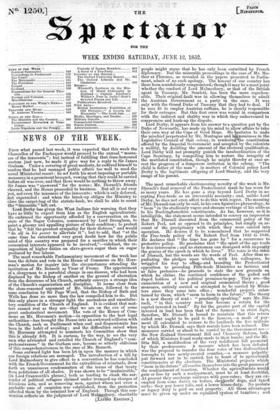NEWS OF THE WEEK.
Emu what passed last week, it was expected that this week the -Chancellor of the Exchequer would proceed to the annual "massa- cre of the innocents " ; but instead of fulfilling that time-honoured custom just now, he made it give way for a reply to Sir James -Graham. Under a covering of great modesty, he suffered himself to 'confess that he had managed public affairs too' well to need the usual.ifinisterial resort : he set forth his most imposing or portable measures in a prominent bouquet, vowing that they Could be carried before all was over, and that there would be nothing to throw away. Sir James was ". answered." for the nonce ; Mr. Disraeli's friends .cheered, and the Mime proceeded to business: But all iint over :yet, not even the massacre of the innocents; which is only deferred, ,not superseded:' and when the break-up obliges the 'Ministry_ to -close the carpet-bag of the statute-book, we shall be able to count
the " innocents" left out. •
Lord Derby has given the West Indians fair warning that they have as little to expect from him as the English agriculturists. He embraced the opportunity afforded by a conversation on the state of the Sugar Colonies, commenced-'by -Lord-Brougham, to paint .a gloomy and appalling pioture of their condition ; to protest that he "felt the greatest sympathy for their distress," and would "do all in Ms power to alleviate it" ; but to add, that "at the same time he entertained very great doubt how far the public mind of this country was prepared for a sacrifice in which their economical interests appeared to be involved,"—videlicet, the re- imposition of higher duties on slave-grown sugar than on sugar produced by free labour. The most remarkable Parliamentary movement of the week has been the debate and vote in the House of Commons on Mr. Hors- man's motion for inquiry into the circumstances attending the institution of Mr. Bennett as Vicar of Frome. The appointment of a clergyman to a parochial charge in one diocese, who had been displaced by the Bishop of another on the ground of aberration from the decorums of his Church, certainly conveys a strange idea of the Church's organization and discipline. It seems clear from the close-reasoned argument of Mr. Gladstone, followed to the same conclusion by Sir Page Wood, that the Bishop of Bath and Wells has done no more than the law compelled him to do. But this only places in a stronger light the anomalous and unsatisfac- tory condition of the Church of England. It is evident that mat- ters cannot rest as they are—that we are on the eve of some great ecclesiastical movement. The vote of the House of Com- mons on Mr. Horsman's motion—in opposition to the best legal authorities—has brought the House into an awkward collision with the Church, such as Parliament when cool and-dispassionate has been in the habit of avoiding ; and the difficulties raised when Mr. Horsman attempted to nominate his Committee show that this is already' felt. It is curious, by the way, to see the very men who advocated and extolled the Church of England's " com- prehensiveness " in the Gorham case, become so utterly oblivious of this comprehensiveness in the ease of Mr. Bennett. Some outward light has been let in upon the manner in which our foreign relations are managed. The introduction of a bill by Lord Malmesbury to give effect to a convention he has concluded with the French Government for the extradition of criminals, drew forth an unanimous condemnation of the terms of that treaty from politicians of all shades. It was shown to be "inadmissible," (in Lord Cranworth's phrase,) both as tending to cloak the sur- render of political refugees claimed under trumped-up charges of felonious acts, and as removing men, against whom not even a probable case of suspicion was established, from the protection afforded them by the criminal law of England. Though this con- vention reflects on the judgment of Lord Malmesbury, charitable
people might argue that he has only been outwitted by French diplomacy. But the miserable proceedings in the ease of Mr. Ma- ther at Florence, as revealed in the papers presented to Parlia- ment, admit of no such apology. The honour of our country has there been scandalously compromised; though it may be a moot point whether the conduct of Lord Malmesbury, or that of the British agent in Tuscany, Mr. Soarlett, has been the more reprehen- sible. Their original fault was in allowing themselves to admit the Austrian Government as a party in the case. It was only with the Grand Duke of Tuscany that they had to deal. If he sees fit to employ Austrian ruffians, he is clearly responsible for their outrages. But this first error was venial in comparison with the indirect and shabby way in which they endeavoured to compromise and hush-up the dispute.
Lord Derby, it appears from his answer to a question put by the Duke of Newcastle, has made up his mind to allow affairs to take their own way at the Cape of Good Hope. He Irsitates to undo the mischief perpetrated by Mr. Montague and, hiliplominees in the Legislative Council of that colony, in renderharthe constitution offered by the Imperial Government and accepted by the colonists a nullity, by doubling the amount of the electoral qualification. Lord Derby will not promptly punish the insubordination of the Cape Secretary, by compelling him to restore the integrity of the mutilated constitution, though he might thereby at owe ar- rest the Progress of a dangerous irritation in the colony. "The child is father of the man': in matters of Colonial policy Lord Derby is the legitimate offspring of Lord Stanley, and the very image of his parent.


























